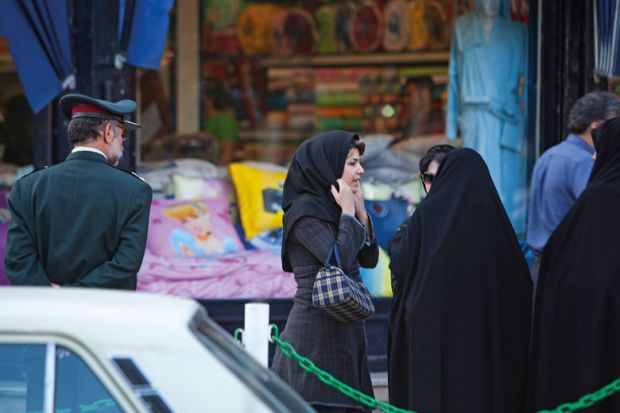One of just a few scholars to resign from an Iranian institution in solidarity with the anti-government demonstrations that swept the country this winter is running out of time to find a permanent job outside the country.
Encieh Erfani – who until recently was assistant professor of physics at Zanjan’s Institute for Advanced Studies in Basic Sciences – is paying the price for voicing solidarity with students during last year’s countrywide protests over the death in police custody of Mahsa Amini, a woman accused of wearing her hijab improperly.
While it is estimated that scores of academics have lost their jobs in a recent cleanse of Iran’s academia, there have been very few reports of voluntary resignations, with many professors staying silent. Dr Erfani believes she is among only six academics to have left in protest.
On a fellowship in Mexico at the time, she saw footage of women removing their headscarves – and longed to join them. At about 5am Iran time on 23 September, the first day of classes, she submitted her resignation.
“I realised it’s not a matter of losing your job and salary. It’s a matter of losing your humanity,” she told Times Higher Education.
Within days, she learned that her resignation letter, which she’d sent to the physics faculty and students, was making the rounds on Twitter. Back at home, her brother received a call from a private number asking about her whereabouts. Her parents also fielded queries from individuals claiming to be Dr Erfani’s students – calls she believes came from Iran’s security services.
“That was an obvious threat from the government saying, ‘Okay, we know what you have done.’”
But even as authorities appeared to be scrutinising her, administrators did not acknowledge her resignation, she said. Weeks later, the pay cheques stopped coming.
Nothing prepared her, though, for the response from her colleagues – people she’d known for years, who in private had criticised government policies and scarcity of institutional resources.
“None of my colleagues supported me. They didn’t even send me an email saying, ‘We’re sorry for what you have done.’”
When Dr Erfani made her decision, she wasn’t expecting to stay abroad indefinitely. She came to Mexico on an academic fellowship with only summer clothes and enough cash to see her through, expecting to return to Iran before the winter. At worst, she expected her move might prompt an interrogation into her conduct. “I was thinking I’ll come back and go to court, they’ll ask questions.”
Now in Europe, she has no doubt that, if she were to go back, she’d go “straight to jail” – something she’s reluctant to do, given the reports of torture, including sexual abuse.
While she was able to find a temporary position, she’s racing to secure a more permanent job. Her passport, which is valid until October 2023, has just one blank page and, per Iranian rules, she can’t renew it outside the country.
“After a few months my passport is not going to be worth anything any more,” she says. “But I don’t regret it. Never ever.”
In the meantime, she’s focused on advocacy for scholars and students in Iran. Her organisation, the International Community of Iranian Academics, has published the most detailed report to date of missing and killed scholars and students, the only one, she believes, which gives a detailed picture of what’s going on in Iranian universities.
“One of our goals is to collect data so if anyone wants to report, they can report properly,” Dr Erfani said.
Register to continue
Why register?
- Registration is free and only takes a moment
- Once registered, you can read 3 articles a month
- Sign up for our newsletter
Subscribe
Or subscribe for unlimited access to:
- Unlimited access to news, views, insights & reviews
- Digital editions
- Digital access to THE’s university and college rankings analysis
Already registered or a current subscriber? Login








